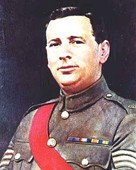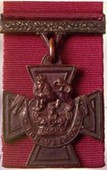 |
 |
MEMORIAL STONE TO REMEMBER
OUR LOCAL HERO
by Rex Needle
 |
 |
MEMORIAL STONE TO REMEMBER
OUR LOCAL HERO
by Rex Needle
|
THE FIRST WORLD WAR began in 1914 and the government is currently making preparations to mark the centenary next year with a series of events across the land, among them memorials to those men who were awarded the Victoria Cross with specially designed paving stones that will be presented to local councils and intended to be laid in their home towns. Among those to be honoured in this way is Charles Sharpe who took part in an Allied assault on Fromelles in France by General Henry Rawlinson's 4th Army during the Battle of Aubers Ridge in the spring of 1915. Sharpe, then aged 26, became the first soldier of the war from his regiment to win the V C, Britain's highest military decoration for gallantry in the field, awarded for most conspicuous bravery, a daring or pre-eminent act of valour, self-sacrifice or extreme devotion to duty in the presence of the enemy. When two companies of his battalion reached the German lines near Rouges Bancs, north-east of Neuve Chapelle after crossing No Man's Land under heavy fire, he captured an enemy trench single handed and led a successful assault on another. The Victoria Cross was founded by Queen Victoria towards the end of the Crimean War in 1856 and was originally cast from the metal of Russian guns taken at Sebastopol. It consists of a Maltese cross made of bronze with the royal crown surmounted by a lion in the centre and a scroll inscribed with the words "For Valour". The number of V C awards made to members of the armed services during the First World War of 1914-18 was 633 and of this number 187 were killed during their acts of heroism. Unfortunately, the government list of those honoured gives Sharpe’s home town as Sleaford which means that the memorial slab is destined to go there whereas he was born at Pickworth in 1889, a village midway between there and Bourne which he always regarded as his home town and where he lived most of life after leaving the army and there is strong evidence to support this. After being honoured for his bravery, Sharpe returned to England on leave for two months and on 24th July 1915, received his medal from King George V at Windsor Castle before taking part in a recruiting drive in Bourne to urge young men volunteer for military service. After the war, he remained in the army until discharged in 1928 with a total of 23 years' service but returned for a further two years during the Second World War when he was in his fifties and although too old for active service, he was gainfully employed at home as a Master Sergeant Cook. As a civilian, he worked on various jobs in Bourne including a spell as a labourer and cleaner at the BRM workshops and he also taught gardening and physical training at the Hereward Approved School in what is now Beech Avenue where the boys regarded him as a role model. It was here that he was injured by a splinter when the school was bombed towards the end of the Second World War. He lived at No 68 Woodview and after a spell as a council refuse collector, his last job was as a gardener for the Bourne United Charities and, ironically, one of his duties was to tend the cenotaph and surrounds in the town's War Memorial gardens where the dead from two world wars are remembered. He eventually moved to live with Dorothy, his daughter from an earlier marriage, at Workington, Cumbria, but a few months later, on 17th February 1963, he was taken ill and died in hospital after a fall, aged 73. The funeral was held at St Nicholas' Church, Lincoln, with full military honours and he was later buried at the city's Newport Cemetery. Although he originated in Pickworth, he has always been regarded as a Bourne hero and is also remembered among our street names, a short cul-de-sac off Beech Avenue which was named Sharpe’s Close shortly after his death. His medals and decorations passed to his children who decided to sell them and in 1989 they were sent to Christie's auction rooms in London and in addition to the Victoria Cross, they included eight campaign and commemorative medals. The sale attracted a great deal of attention and press coverage and two local men, Fred King and the late Melvyn Patrick, both deeply interested in the First World War, launched a fund to buy the medals for public display in the town but the £4,000 they raised in donations and promises was insufficient to secure them and they went to a surprise bidder from South Kesteven District Council who bought them for £17,000 on behalf of the community to commemorate the centenary year of Sharpe's birth. The medals were cleaned, polished and mounted to enable them to be put on permanent display and they are now on show with other regalia in the chairman's office at the council’s headquarters in Grantham, although visitors can see them on request while copies are on display at the Royal Lincolnshire Regiment's museum in Lincoln. Concern about the placing of the memorial paving stone has also been expressed by members of the Pickworth Local History Group who insist that Bourne should be the selected town. “The first thing that occurred to us was that Pickworth was not appropriate but Sleaford does not make sense”, said their spokesman Joe Seddon. “Bourne would be as natural a connection with Charles locally as Pickworth has been historically and we are hoping that this will be changed by the appropriate authority.” It is therefore quite clear that Bourne should be the official location but fortunately help is at hand. After contacting South Kesteven District Council and Bourne Town Council advising them of the situation, officers are to ask the Communities Secretary, Eric Pickles, and the Culture Secretary, Maria Miller, to amend the official list by changing the name Sleaford to Bourne and so ensure that the memorial stone is laid in its rightful place in the town centre next summer. |
NOTE: This article was published by The Local newspaper on Friday 23rd August 2013.
Return to List of articles